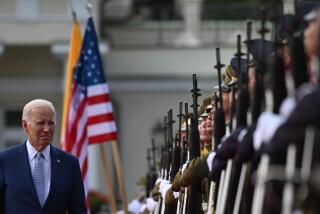THE WASHINGTON SUMMIT : BRIEFING / TODAY’S TALKS : Camp David May Be Setting for Bringing Up Baltics
- Share via
WASHINGTON — Like an unwanted party guest, the issue of the Soviet Union’s three Baltic republics--Lithuania, Latvia and Estonia--continues to wait in the corners of the Bush-Gorbachev summit.
For each president, the issue has both domestic and foreign policy components. Neither wants the continuing conflict over Baltic independence to worsen superpower relations. But neither President Bush nor Mikhail S. Gorbachev can ignore domestic concerns that push them toward confrontation.
Bush said Thursday that Lithuania had come up only briefly in the summit’s first day, but aides suggested that the two would revisit the controversy during their Camp David talks today.
Background
All three Baltic states have long histories intertwined with Russia. At times, each of the Baltic countries have been independent. At other points, all have fallen under Russian rule. After World War I, Estonia, Latvia and Lithuania were each re-established as independent states. Under a secret treaty with Nazi Germany, all three were occupied by the Soviet army during World War II in 1940. After plebiscites conducted under tight army control, all three were incorporated within the Soviet Union as republics.
On March 11, Lithuania declared its independence from the Soviet Union. The other two republics have also voted to secede, although they have chosen a less rapid path than Lithuania. Moscow has applied increasing economic pressure on all, including an embargo on Lithuania that has all but wiped out Lithuanian fuel reserves.
U.S. Position
Officially, the United States has never recognized the Soviet takeover of Lithuania, Estonia and Latvia. The three republics have maintained diplomatic offices in Washington, and U.S. Presidents have issued annual “Captive Nations Day” proclamations pledging to support independence for the Baltic peoples.
Now that the prospect has become real, past rhetoric has created an awkward situation for Bush and his aides.
Bush has said publicly that he fears any open U.S. support for the independence moves could spark Baltic populations into a revolt that the Soviet army would crush. Privately, in sessions with members of Congress who support Baltic independence, he has pointed out there is little concrete help the U.S. government can provide.
The President has tried to raise the independence issue in public enough to quiet conservative opposition at home, but has tried to avoid doing so in ways that would anger Soviet leaders. He has limited himself to a call for “peaceful dialogue” between the two sides.
Soviet Position
In dealing with the Baltics themselves, Gorbachev has said they must work within the Soviet legal system, which officially recognizes the right of secession but establishes an elaborate procedure that would take several years to complete.
As far as any U.S. role is concerned, Gorbachev has repeatedly declared that the future of the Baltics is an “internal matter” for the Soviet Union. Outside countries have no business meddling, he has said. At the same time, Soviet officials have given some indications of being willing to negotiate and have said that independence could be granted to the Baltic republics over a period of a few years if certain conditions are met.
Prospects
Neither Bush nor his aides have suggested that the summit talks will resolve the Baltic issue. But Bush is hoping to prod Gorbachev into going ahead with negotiations, reminding him that because of pro-Lithuanian sentiment in Congress, efforts to improve trade between the United States and the Soviet Union will remain stalled until the Baltic stalemate is eased.
More to Read
Sign up for Essential California
The most important California stories and recommendations in your inbox every morning.
You may occasionally receive promotional content from the Los Angeles Times.














